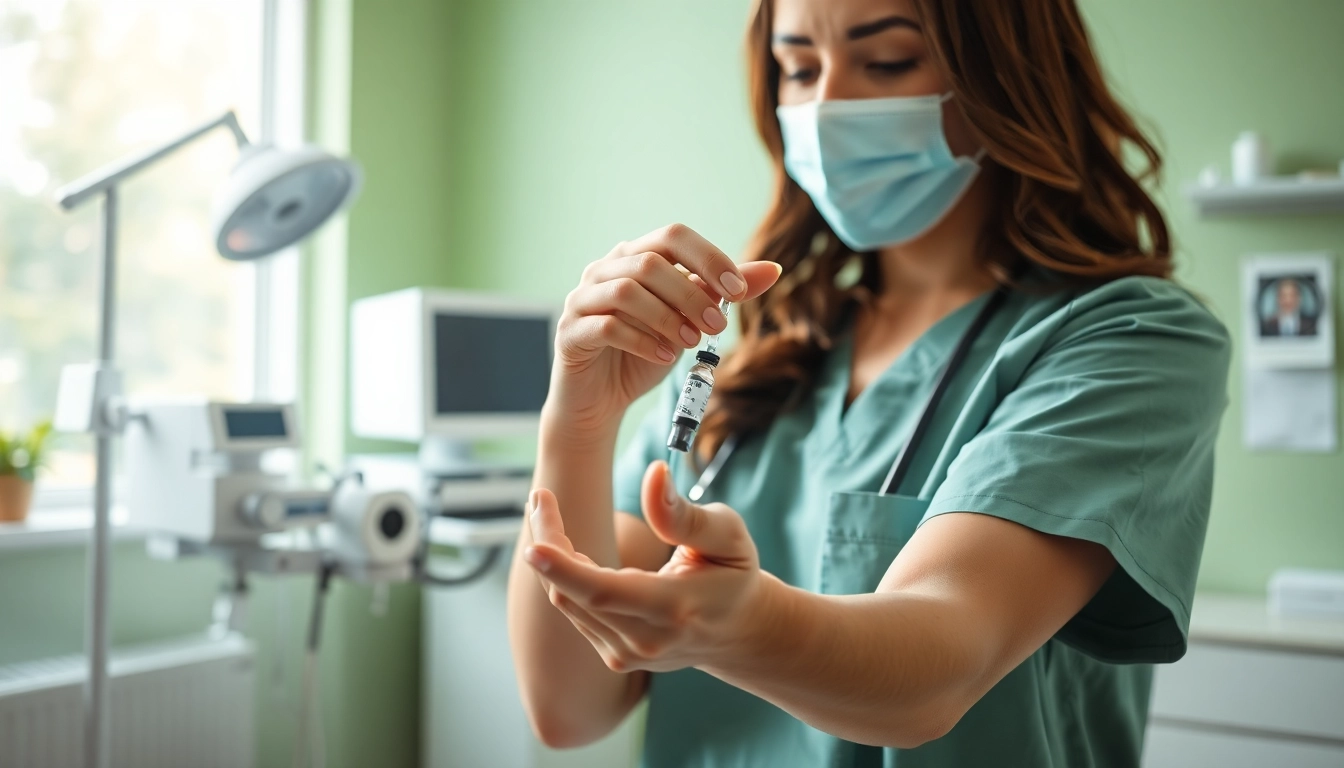Understanding Vitamin B Shots
What Are Vitamin B Shots?
Vitamin B shots, also known as B vitamin injections, are intramuscular injections that deliver an essential complex of B vitamins directly into the bloodstream. These vitamins play a vital role in numerous bodily functions, including energy production, brain health, and metabolism. Unlike oral supplements, which can be less efficiently absorbed due to digestive processes, vitamin B shots allow for immediate utilization by the body. This makes them a preferred choice for individuals experiencing deficiencies or needing an extra boost in their vitamin B intake.
Types of Vitamin B and Their Benefits
Vitamin B encompasses a group of eight water-soluble vitamins, each with unique roles and benefits:
- B1 (Thiamine): Essential for energy metabolism and nerve function.
- B2 (Riboflavin): Supports energy production, healthy skin, and vision.
- B3 (Niacin): Aids in the conversion of food into energy and promotes skin health.
- B5 (Pantothenic Acid): Necessary for the synthesis of coenzyme-A, crucial for fat metabolism.
- B6 (Pyridoxine): Involved in protein metabolism and the formation of neurotransmitters.
- B7 (Biotin): Promotes healthy skin, hair, and metabolism of fats and carbohydrates.
- B9 (Folate): Vital for DNA synthesis and cell division, particularly important during pregnancy.
- B12 (Cobalamin): Critical for red blood cell formation, neurological function, and DNA synthesis.
How Vitamin B Shots Support Overall Health
Vitamin B shots can significantly enhance overall health. They help improve energy levels, boost mood and cognitive function, support immune health, and play a role in maintaining heart health. For those struggling with vitamin B deficiencies, which can lead to fatigue, irritability, and cognitive issues, these injections are an effective remedy. Furthermore, by ensuring adequate levels of B vitamins, individuals can better manage stress levels and improve their general well-being.
The Scientific Basis for Vitamin B Shots
How Vitamin B Affects Energy Levels
B vitamins are the body’s energy powerhouses; they are essential for converting carbohydrates, fats, and proteins into usable energy. For instance, B1 is critical in the Krebs cycle, which generates ATP (adenosine triphosphate), the energy currency of the cell. When people receive vitamin B shots, they often report increases in energy and reduction in feelings of fatigue, thanks to the immediate availability of these crucial nutrients for metabolic processes.
The Role of Vitamin B in Metabolism
The B vitamins collectively play indispensable roles in metabolic pathways. For example, B6 is necessary for amino acid metabolism, while B12 is crucial for fatty acid metabolism and energy production. A deficiency in these vitamins can lead to metabolic dysfunctions, including a slowed metabolism and difficulties in weight management. Studies have shown that individuals with optimal B vitamin levels typically experience better metabolic health and weight maintenance.
Research Studies on Vitamin B Effectiveness
Numerous studies have been conducted to evaluate the effectiveness of vitamin B shots in improving health outcomes. For instance, a 2020 study published in the ‘Journal of Nutrition’ found that vitamin B12 injections significantly improved clinical symptoms of deficiency among participants over six months. Additionally, research highlighted the positive effects of B complex injections on energy levels, mental clarity, and even mood stabilization. Such findings point to the critical need for adequate vitamin B levels, especially in high-risk populations.
Who Can Benefit from Vitamin B Shots?
Identifying Vitamin B Deficiency Symptoms
Recognizing the symptoms of vitamin B deficiency is essential for early intervention. Common signs include:
- Fatigue and weakness
- Pale or jaundiced skin
- Memory loss or cognitive decline
- Depression or mood swings
- Digestive problems
- Nerve damage, often presenting as tingling or numbness
If you experience these symptoms, it may be time to consult a healthcare provider about the potential benefits of vitamin B shots.
High-Risk Groups for Vitamin B Deficiency
Some populations are at a higher risk for vitamin B deficiencies, including:
- Vegetarians and vegans (particularly at risk for B12 deficiency)
- Individuals with gastrointestinal disorders (Celiac disease, Crohn’s disease)
- The elderly, who may have difficulties in nutrient absorption
- Those on strict calorie-restricted diets
- People with alcohol dependency, as alcohol can interfere with nutrient absorption
Consultation: Who Should Get Vitamin B Shots?
Consulting with healthcare professionals is vital for determining if vitamin B shots are appropriate. Individuals with identified deficiencies, those in high-risk groups, and individuals seeking enhanced energy and metabolic function should consider getting vitamin B injections. A thorough blood test can help assess vitamin levels and guide treatment decisions effectively.
Administering Vitamin B Shots: Overview
What to Expect During Your Visit
When you receive a vitamin B shot, expect a straightforward process:
- Consultation: A healthcare provider will review your medical history, symptoms, and dietary habits.
- Testing: Confirming deficiency through blood tests is common.
- Administration: The vitamin B shot will be administered via intramuscular injection, often in the arm or thigh.
- Observation: You may be asked to remain for a brief period for observation to ensure there are no immediate adverse reactions.
How to Prepare for Your Vitamin B Shot
Preparation for a vitamin B shot involves minimal steps:
- Stay hydrated.
- Inform the healthcare provider of any medications or allergies.
- Consider wearing loose clothing for easy access to the injection site.
Post-Administration Care and Follow-up
After receiving a vitamin B shot, expect some mild soreness at the injection site. Here’s how to care for yourself:
- Avoid vigorous exercise or heavy lifting immediately after.
- Monitor for any unusual side effects, such as an allergic reaction.
- Schedule a follow-up appointment to assess vitamin levels and overall effectiveness.
Vitamin B Shots vs. Oral Supplements
Comparing Effectiveness: Shots vs. Pills
Comparing vitamin B shots to oral supplements reveals significant differences in efficacy. Studies showcase that vitamin B shots lead to higher serum levels of these vitamins than oral supplements due to the direct delivery into the bloodstream. Oral supplements require digestion and absorption, which can be impaired in certain individuals, limiting their effectiveness. Therefore, those with absorption issues or severe deficiencies may benefit more from injections.
Cost Considerations: Is It Worth It?
The cost of vitamin B shots can vary widely depending on the provider and location, usually ranging from $20 to $100 per injection. While this may seem steep compared to simple oral supplements, the enhanced absorption, immediate effects, and targeted delivery make shots a valuable investment for individuals suffering from deficiencies or seeking improved health outcomes. Additionally, one must consider the potential costs related to health complications arising from untreated deficiencies.
Long-term Benefits of Getting Vitamin B Shots
For many, the long-term benefits of vitamin B shots are noteworthy. Regular injections can contribute to sustained energy levels, improved mental clarity, better mood stability, and overall enhanced wellness. Additionally, by preventing deficiencies, individuals can avoid potential health issues linked to low B vitamin levels, such as anemia, neurological disorders, and cardiovascular problems. Many patients report ongoing improvements and a better quality of life with consistent vitamin B shots.



